 Petzlover
Petzlover Dingo is originated from Australia but Grand Anglo-Francais Blanc et Noir is originated from France. Dingo may grow 12 cm / 4 inches shorter than Grand Anglo-Francais Blanc et Noir. Both Dingo and Grand Anglo-Francais Blanc et Noir are of same weight. Dingo may live 8 years more than Grand Anglo-Francais Blanc et Noir. Both Dingo and Grand Anglo-Francais Blanc et Noir has almost same litter size. Both Dingo and Grand Anglo-Francais Blanc et Noir requires Moderate Maintenance.
Dingo is originated from Australia but Grand Anglo-Francais Blanc et Noir is originated from France. Dingo may grow 12 cm / 4 inches shorter than Grand Anglo-Francais Blanc et Noir. Both Dingo and Grand Anglo-Francais Blanc et Noir are of same weight. Dingo may live 8 years more than Grand Anglo-Francais Blanc et Noir. Both Dingo and Grand Anglo-Francais Blanc et Noir has almost same litter size. Both Dingo and Grand Anglo-Francais Blanc et Noir requires Moderate Maintenance.
 The Dingo dog was in all probability, introduced to Australia thousands of years ago. He isn’t your usual domesticated dog and in fact it is a feral dog native to Australia.There are stories that suggest that while they may have once been pets, they were abandoned so that they reverted back to their wild state.
The Dingo dog was in all probability, introduced to Australia thousands of years ago. He isn’t your usual domesticated dog and in fact it is a feral dog native to Australia.There are stories that suggest that while they may have once been pets, they were abandoned so that they reverted back to their wild state.
They became pests for Australian farmers, going for their livestock, and huge fences were erected. The different climates in Australia have meant different kinds of Dingo developing, so while the desert ones are like the desert sands - golden yellow to red the alpine ones are rarer and are cream colored.
These wild canines were also introduced to Southeast Asia some 3,500 years ago, however the dog’s exact origin is debatable. There are any number of groups of people who could have brought the dingo to Australia, and among some of these are Indian mariners or maritime hunters.
The dog has been found in many parts of mainland Australia but never became established in Tasmania.There has also been an effort to remove the Dingo from farming areas. It is interesting to note that the first Dingo, referred to as the Australian dog, was registered at the London Zoo in 1828.
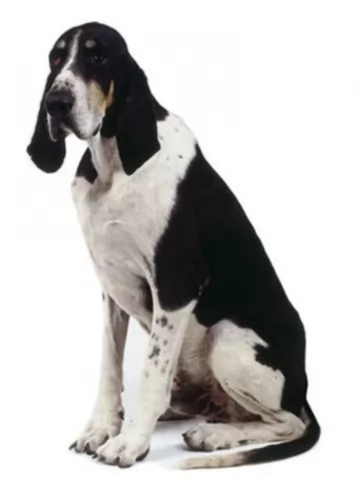 Known also as the Great Anglo-Francais, White and Black Hound or the Grand Anglo, the Francais Blanc et Noir is one of several breeds of hounds.
Known also as the Great Anglo-Francais, White and Black Hound or the Grand Anglo, the Francais Blanc et Noir is one of several breeds of hounds.
The dog was bred by crossing French scenthounds with English Foxhounds.The Grand Anglo-Français Blanc et Noir has always been used for hunting. As a scenthound, hunting was always done in packs and he thrilled at the chase.
The large dog originates in France and is recognized by the French Kennel Club as well as the Federation Cynologique Internationale.The purpose of this breed standard is to provide guidelines for breeders wishing to maintain the quality of their breed, but to also improve it.
 An interesting fact with these fascinating feral dogs, is that like humans, they’ve got rotating wrists. This characteristic of theirs allows them to use their paws much like the human hand to catch their prey. A domesticated Dingo can therefore learn how to open doors.
An interesting fact with these fascinating feral dogs, is that like humans, they’ve got rotating wrists. This characteristic of theirs allows them to use their paws much like the human hand to catch their prey. A domesticated Dingo can therefore learn how to open doors.
The Dingo is a medium sized dog standing at roughly 52 – 60cm in height, measuring up to 1.2 meters in length and weighing roughly between 23 to 32kg.
He has long canine teeth, a long muzzle, upright ears and a long, thick tail. The coat is essentially one color, sandy, white, cream, tan or black and sometimes there are white markings on the chest, the paws and around the muzzle.
The fur is typically shortish and thick — though the hair's thickness and length will depend on the climate of the area. The Dingo is a moderate shedder and a good brushing of the coat twice a week will keep the thick coat shiny and healthy.
These wild canines are social animals, and in the wild they live in packs. There are some that opt to live on their own.
They’e territorial, but they are able to share their living space with humans. They’re generally shy around humans, but a Dingo that is trained and socialized can get along well with children and pets in the home.
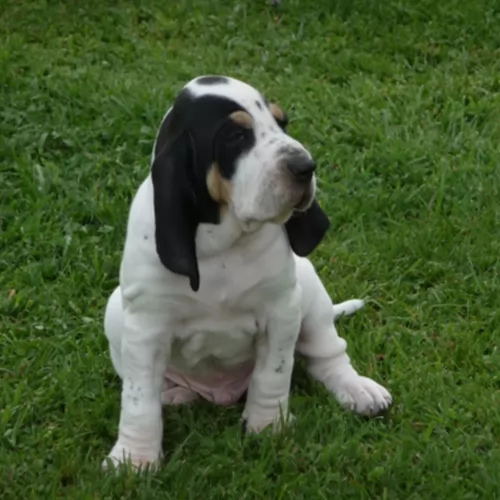 The Grand Anglo – Francais Blanc et Noir is a big, powerful dog standing at 62 – 72cm and weighing 27 - 32kg. His chest is broad and deep.
The Grand Anglo – Francais Blanc et Noir is a big, powerful dog standing at 62 – 72cm and weighing 27 - 32kg. His chest is broad and deep.
The head is flat and broad, the nose black with gentle looking brown eyes. The coat is short and dense for protection and the coloring is black and white. There is a tan dot above each eye. The ears are floppy. The tail is long and tapers down to a slender point.
As a superb hunting dog, this breed lives for the hunt and loves nothing more than to be chasing its prey. The dog has an excellent sense of smell and can track prey in all kinds of terrain.
Although the dog has a stable temperament, he isn’t recommended as being kept solely as a pet, even though he is gentle with children. Maybe its because he has a more serious personality and would prefer to live with active, sport-loving adults than having to contend with the antics of children.
He also isn’t the best dog to have around other small pets as he is so prey-driven he may well be aggressive towards them.
He isn’t a city-loving dog and with his high energy levels he is best suited to properties with large gardens or to farm life. While he will bark and alert you to strangers, he won’t make a particularly good watchdog as he isn’t aggressive.
 Dingoes have been domesticated successfully. Some people swear by them as making a fantastic pet. However, they’re wild dogs and can be unpredictable.
Dingoes have been domesticated successfully. Some people swear by them as making a fantastic pet. However, they’re wild dogs and can be unpredictable.
There are others who have tried to keep the Dingo as a pet but who have discarded them when they proved to be a danger in the home.
Dingoes can be trained but they’re high energy dogs and require a lot of exercise. How do you feel about owning a Dingo as a pet? Many people feel that its not fair to bring an essentially wild animal into your home. They feel that there are plenty of rescue dogs dying for a home without human beings searching in the wilds for an unusual pet, and regretting it later on.
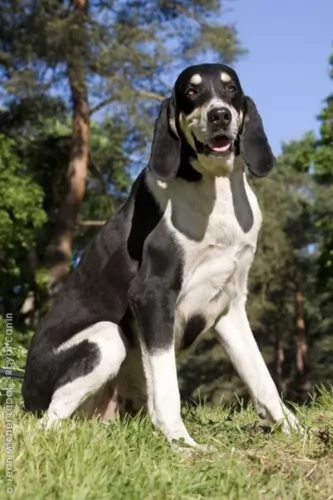 Essentially known as a pack dog, the Grand Anglo-Français Blanc et Noir isn’t going to do well with anyone who lazes on the couch all day.
Essentially known as a pack dog, the Grand Anglo-Français Blanc et Noir isn’t going to do well with anyone who lazes on the couch all day.
He is energetic and driven, and will develop all kinds of behavioral issues if not properly and adequately exercised.
Fitting into a household where hunting is part of the lifestyle will be ideal for him, loving the outdoors and the stimulation that comes from hunting with other dogs.
Provide him with an outdoorsy, active owner and this hunting dog will ensure that he is your loyal and loving companion.
 The Dingo is a long-lived dog and you can expect your Dingo to live till anything between 15 and 20 years.
The Dingo is a long-lived dog and you can expect your Dingo to live till anything between 15 and 20 years.
When it comes to health issues, they are robust and resilient, having less medical problems to contend with than your regular dog.
However if you see that your Dingo is not his usual robust, energetic self, get him to the vet as soon as you can.
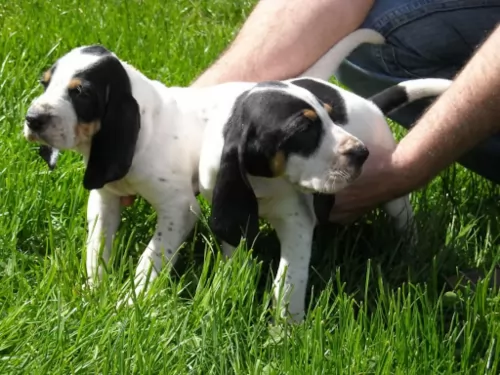 Capable of reaching 10 to 12 years of age when looked after well, there aren’t any specific health issues with this dog. He is likely to experience one or two issues that other dogs have to contend with as well.
Capable of reaching 10 to 12 years of age when looked after well, there aren’t any specific health issues with this dog. He is likely to experience one or two issues that other dogs have to contend with as well.
There are one or two diseases that you want to be aware of -
This dog has long, floppy ears and this means that air doesn’t reach inside the ears properly. He is therefore prone to ear infections. After he has been swimming, dry his ears gently inside.
Unfortunately this is a disease that can strike even when your Grand Anglo-Francais Blanc et Noir is a puppy. Hips which aren’t formed properly can cause stiffness, pain and lameness in your pet.
 Caring for your Dingo will be different to caring for your usual pet dog. You have to remember the Dingo is an ancient, wild species with some unique characteristics. Having a Dingo as a pet and companion may not be an easy task, and it is why many people selfishly dump their Dingoes – they didn’t quite live up to what they had in mind.
Caring for your Dingo will be different to caring for your usual pet dog. You have to remember the Dingo is an ancient, wild species with some unique characteristics. Having a Dingo as a pet and companion may not be an easy task, and it is why many people selfishly dump their Dingoes – they didn’t quite live up to what they had in mind.
Your Dingo, just like any other dog you’d have, will require training and socialization, and the earlier the better. No training will simply mean you having an unruly pet in the home.
Your Dingo can be fed just like you would with your other dogs. You can feed him quality dog kibble as his main diet, but you can also add in cooked rice, vegetables and chicken. Your Dingo is essentially a wild dog, so you will definitely want to include some raw meat into his diet from time to time as well.
A Dingo is used to running free so he will require plenty of outdoor exercise. He can also be put on a leash and taken for a walk. He’ll love joining you in your activities such as running alongside you as you jog or cycle. He can adapt to life in the city if he is well exercised but he isn’t suited to a small home or garden.
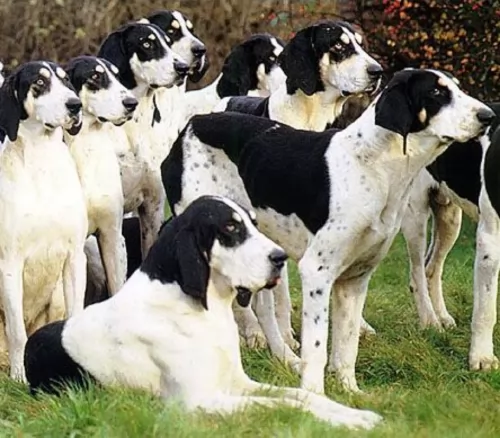 With his short coat and being an average shedder, the Grand Anglo-Francais Blanc et Noir is an easy dog to groom, requiring a brush twice a week.
With his short coat and being an average shedder, the Grand Anglo-Francais Blanc et Noir is an easy dog to groom, requiring a brush twice a week.
Check his ears inside and out, particularly if he goes swimming. Excess moisture in the ear can encourage bacteria and ear infections. See that his nails are trimmed and remember to check his teeth for dental disease which can cause ill health generally.
As a hunting dog, he will need a good deal of exercise. He won’t be content to just go for a walk once a day, but will want something more hectic such as joining you as you go hiking, cycling, swimming or jogging.
As a scenthound, your Grand Anglo – Francais Blanc et Noir is always out and about sniffing around looking for a tasty treat, but with these active dogs, the secret is to small, frequent meals as apposed to 1 or 2 large meals.
It is important to see he gets a nutritionally complete balanced diet that gives him slow release energy. Check with your vet if you’re unsure what to feed him. You want to avoid foods high in fillers, colorants and preservatives.
There are some excellent commercially manufactured dog foods for high energy dog,s but make sure to go for the best brands. You can mix his kibble with some raw meat occasionally and also give him cooked brown rice, chicken and vegetables. He’ll need a constant supply of fresh, cool water.